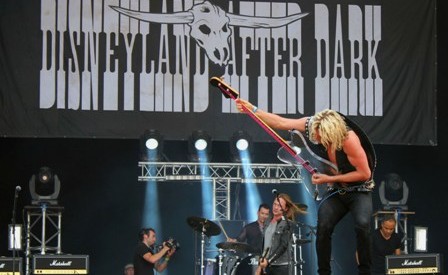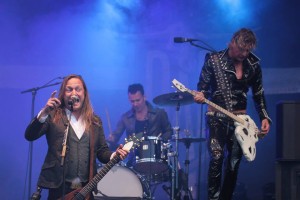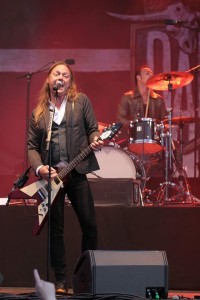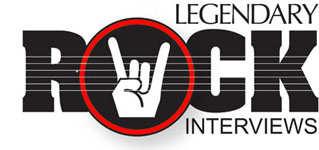D.A.D. (Disneyland After Dark) Singer Jesper Binzer on Band’s Early Days, Recent U.S. Tour, Unique Sound And More!

Fans of the Danish hard rock band D.A.D (Disneyland After Dark) have had a lot to be happy about in 2013. The U.S. release of their last album, “DIC.NII.LAN.DAFT.ERD.ARK” (say it slowly) their first North American tour in over 20 years and now can wait for the release of a new 30 song career spanning package called “30/30/30” which will be coming in 2014. It’s all a little bit of validation for a band who have been at it since 1984 and are known as one of the very best live acts in hard rock. I had the chance to talk with guitarist/vocalist Jesper Binzer about it all, read on…. -Lead Photo Credit: metaltraveller.com
Legendary Rock Interviews: Thanks for talking to me, your last album “DIC.NII.LAN.DAFT.ERD.ARK” has so much of that sound that made me originally like the band back in the “No Fuel Left For The Pilgrims” days and so much of that includes some classic melodies from musical eras past. How much of that comes from the music you grew up on in Denmark?
Jesper Binzer: I think that everything evolves and everything becomes a part of your musical DNA once you’re exposed to it long enough. I think that what’s important is that you don’t become a clone or copycat of your influences. I think the audience looks for your own personal touch so maybe you could say that over the years we have been able to find our own way of working within those influences.
LRI: You guys were finally able to tour here in the United States this year for the first time since 1996. I know you released many great albums but the touring just wasn’t in the cards until this past year, how did it feel to get off the plane and come back to the U.S. for shows and how were the audiences?
Jesper Binzer: It was great. The people in the States were so supportive. Someone posted a clip on our Facebook page of a show and we were playing a song which wasn’t released there, it hadn’t been out in America and wasn’t even anything in Europe. It was just a little, stupid song that we enjoy playing and the guy who was taping it and uploaded it to YouTube was singing along and the people next to him were singing along and it was just such a cool and funny thing that all these people stuck with us and remember us there. It felt like love, it was beautiful, just beautiful especially since it had been so long. I mean all of us have taken holidays and visited friends in America but as a band, D.A.D. it had been maybe 23 years. It was totally wild but then again, the internet has made it so that audiences can follow your career, including albums that maybe weren’t even released there but also the internet makes it so you can communicate immediately with your audience. Of course, nothing compares to playing the live show and I think having been around as long as we have, our audiences are confident that we are….. experienced enough, I’ll say that because I don’t wanna say “old” (laughs) but experienced enough, to put on a solid live show.

LRI: For some of those younger fans who might not be aware of the band’s initial burst here I wanna ask you a question that I’m sure you’ve answered a million times but maybe you could indulge once more…..How did you originally come to the attention of Warner Brothers Records when you were signed here in the States?
Jesper: It was pretty funny. We were doing our own thing. “No Fuel Left For The Pilgrims” had been released in Denmark and suddenly there was a lot of interest, it started and just grew from there until it got to Warner Brothers attention. They flew over to Denmark to watch us play a festival and some other shows outside Copenhagan and then there was kind of a bidding war going on. There were some of the top, top, top players at Warner Brothers which was fantastic, it was guys like Mo Ostin and Lenny Waronker who were the big guys there at the time. We treated them to a stupid, stupid party at our rehearsal space where they had to compete riding tricyles while we were mixing them drinks. They didn’t know what was in the drinks because D.A.D were the bartenders, we were basically giving them the D.A.D. treatment and then after that we signed with Warner Brothers.
LRI: You guys are a bunch of bastards (laughs)
Jesper: Yes, we were (laughs).
LRI: Obviously you have matured a little bit, did coming back to the U.S. remind you of any of those wild old days?
Jesper: That’s actually a good question because I was trying to put things in perspective recently. I think that I have matured and it’s been so long since we’ve seen America as a place of opportunity for D.A.D……like I said it’s been more of a place for us to hang out and relax so it has taken on another shape for us in a sense so it felt so natural for us to come over and just relax and play music. It’s a whole new ballgame, it’s a whole new time and on top of that maybe, maybe we have changed.

D.A.D. on the cover of their initial U.S. release, No Fuel Left For The Pilgrims
LRI: How many strings does Stig Pederson have on his bass these days?
Jesper: He’s got two strings, he doesn’t need any more (laughs).
LRI: You guys play a lot of shows in Europe and tour pretty relentlessly. How does that affect your approach as far as making records?
Jesper: Well, the latest record that came out this year in America was already out in Europe and it took us a step forward here at home because you could tell it was definitely made while we were touring. We toured a lot the past few years and were in that mode all the time. We would be out playing live and then get into the studio with so much of that energy was put into it and I think the audience can hear that. Of course we spent all the time and effort we could in the studio to make it sound good but we also wanted to keep a lot of that live energy flowing. Nick Foss produced it and to be quite honest, we had been without him for a number of years because we didn’t really have the balls to call him for the previous two albums. We didn’t want to admit that maybe the songs weren’t quite strong enough but i think we can be honest now and say that perhaps they just weren’t. So it said a lot when we felt confidant enough to call Nick for the last album.

LRI: It almost sounds like he’s the fifth member of the band.
Jesper: Yeah, he is pretty much. As a person he is very much a “from the heart” kind of person. He doesn’t bear grudges, he doesn’t play games, he’s just a heart with ears so to speak. That means that he carries the whole D.A.D. story with him without any bitterness or anything. He’s just with us and he’s been with us for so long and he’s extremely important for us to have a guy like Nick. With an old band like us it is so easy to surround yourself with Yes-men and that is such a dangerous thing to do. It makes far more sense to hang on to your old friends and the people who know who you really are, that’s who we chose to surround us.
LRI: When you guys arrived and “Sleeping My Day Away” started getting airplay it was clear that you were very, very different from so many of the 80s hard rock and hairspray bands you were getting lumped in with. I think the fans who bought the album and related to you were almost picking up on that difference and this was well before grunge or alternative started to take hold here. Do you think that served you well in the long run?
Jesper: Thank you, I’m very glad you picked up on that. When we started out it felt like we were part of a subculture that spanned the globe and wasn”t really mainstream but could still relate to people all over the planet in our own little quirky, intellectual, break out of the mold kind of way. We knew we weren’t like every band and we had a feeling that there were other people, maybe not many but definitely other people who felt the same way, like we felt. I think that’s our perspective on our audience as well as ourselves in a way, maybe we weren’t shooting for the mainstream so much as trying to catch the attention of people who liked to smirk a little higher towards the ceiling so to speak.
LRI: Obviously, now that you’ve grown along with that audience do you think you’re inspired to write by totally different things?
Jesper: I think I’m at my best age at the moment. I’m 47 and I feel like I’m not so insecure anymore. I feel like I’m carrying my own and I feel like I still have all the energy and all things going for me. I think that if you can reach that point where you feel comfortable in your own skin totally that it’s beautiful and I’m pretty sure that it was rock and roll that gave me that opportunity to be able to fill out my skin at this point. On the other hand, I’m not alone here in D.A.D. so I have that luck of being able to chip away at the same stone so at least at this point we all really know each other. We also know what kind of assholes we are underneath (laughs) so it’s a pretty fun social experiment. It’s a life. It’s not a career, it’s not business, it’s life, there were three or four guys going into this and there will be three or four guys going out of this. What’s in between, doesn’t really matter, what matters is that we did it and we did it together. That’s one of the reasons we came back to play some in America again, we need to be a gang again, us against the world and we need to get ready to make another album and keep coming up with more songs. Before that we will be releasing our new greatest hits, career album celebrating 30 years of doing what we do. When I say we, I mean the band, because the record company really doesn’t really exist anymore and we fired the management because we know how to do D.A.D. (laughs). So stay tuned!
https://www.facebook.com/d.landafterdark
Category: Interviews



